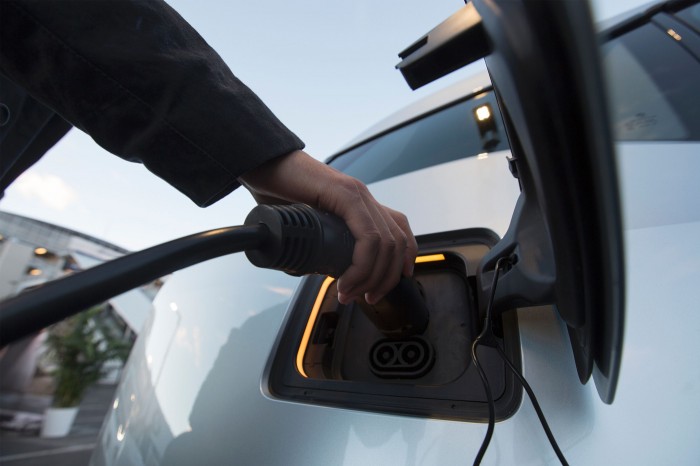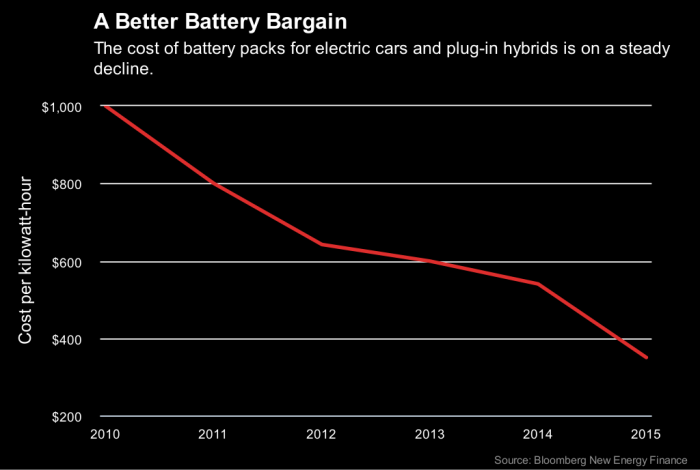Here’s How to Speed Up the Electric-Car Revolution
The future of cars may be electric, but bringing that future into the present will require tough policy decisions to be made by governments.
A new report by Bloomberg New Energy Finance and McKinsey & Company reaffirms what MIT Technology Review has said in the past: by 2030, electric vehicles will be a dominant mode of transport. In fact, the new research estimates that as many as two-thirds of all cars on the road in some wealthy cities could be electric by that point.
Anyone who visited the Paris Motor Show last month may think such a future is inevitable. There, as many as two dozen new electric cars were announced. Many will be on sale as soon as next year, and most by 2020. Proclamations by BMW suggest that electric cars could make up as much as 25 percent of its sales—that’s in the region of 500,000 cars per year—within the next 10 years.

The ability to create mass-market electric cars—a trend arguably jump-started by Elon Musk and his vision for the forthcoming Tesla Model 3, even if it is now facing increasing competition—is facilitated in part by the swiftly falling price of lithium-ion batteries. Prices have fallen by 65 percent since 2010 (see chart) and look set to halve again in the next 10 years.
But despite such optimism, widespread adoption of electric vehicles will still require aggressive policy decisions. The Bloomberg-McKinsey report suggests that a purely consumer-driven adoption of electric vehicles could lag a regulatory-driven approach by somewhere between five and seven years.

The EU is already setting a strong example of the kind of changes that will be required. The Guardian reports that a new draft EU directive, expected to be enacted in 2019, will demand that every new or refurbished house in Europe have a charging point for an electric vehicle. Another regulation, expected to be published before the end of the year, will demand that at least 10 percent of parking spaces in new buildings include a charging point.
Earlier this week, Germany’s federal council, the Bundesrat, passed a resolution to ban the internal-combustion engine by 2030 across the EU. The vote doesn’t carry much weight in isolation, because it’s up to the EU itself to make such a decision, but it does send a very clear message of intent from the German government. And, as Forbes notes, Germany has historically had significant influence over EU lawmaking.
Such regulations may yet spark the rapid proliferation of electric vehicles, but other countries and cities will have to follow the EU’s early regulatory lead.
(Read more: Bloomberg New Energy Finance and McKinsey & Company, Bloomberg, The Guardian, Ars Technica, “The Paris Motor Show Confirms It: The Future Is Electric,” “The 2020s Could Be the Decade When Electric Cars Take Over”)
Keep Reading
Most Popular
Large language models can do jaw-dropping things. But nobody knows exactly why.
And that's a problem. Figuring it out is one of the biggest scientific puzzles of our time and a crucial step towards controlling more powerful future models.
How scientists traced a mysterious covid case back to six toilets
When wastewater surveillance turns into a hunt for a single infected individual, the ethics get tricky.
The problem with plug-in hybrids? Their drivers.
Plug-in hybrids are often sold as a transition to EVs, but new data from Europe shows we’re still underestimating the emissions they produce.
Stay connected
Get the latest updates from
MIT Technology Review
Discover special offers, top stories, upcoming events, and more.